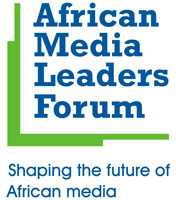TUNIS: Mobile is often seen as the medium for Africa - the personal, portable devices are more numerous on the continent than traditional desktop computers.
A plenary discussion on the first day of the 2011 African Media Leaders Forum [10-11 November 2011] centred on the potential this mobile technology has to disrupt traditional distribution models for media content, and how media organisations can make use of this medium to reach their audience.
"Traditional media has its limitations. The mobile screen is the next platform," explained the Mobile Entertainment Forum's Emma Kaye.
"We are leap-frogging the PC and desktop environment in Africa - instead, we're going straight to mobile," Kaye added.
Mobile platforms like cell phones give media organisations the opportunity to interact with communities on a platform that is always on and used throughout the consumer's day. The devices allow for a level of personal interaction that is not possible with traditional media outlets.
"There is a deep need to interact and the mobile platform has the potential to actively engage the end user," explained Kaye.
Despite the strengths of the mobile platform, many companies find it difficult to make money from mobile devices. Audiences are often reluctant to pay for content, and some media organisations find it difficult to generate revenue.
The speakers emphasised the need for quality content if media organisations aim to profit from mobile platforms. "People are only willing to pay for things that interest them," said chairman of MTN in Cameroon, Colin Mukete.
"If your content is good enough, people will pay for it," said Motribe founder Vincent Maher.
The speakers suggested that journalists focus on producing unique, contextually relevant, local content for the mobile platform, as users can find other more general information easily, but hyper local content is the most valuable for audiences.
Pay on the go
Mobile devices also allow for micropayments directly from the users, as users can be charged through their cellphone accounts.
"95% of mobile users are prepaid, and have the ability to make micropayments," explained Maher. This allows media organisations to profit from subscription fees and other payments, while allowing users to make a quick, safe and easy transaction.
The range of mobile devices in circulation is extensive, but Maher explained that media organisations could tailor the content to suit the handsets their target market uses.
For example, Unstructured Supplementary Service Data (USSD) allows users to send a message and receive content in response, without requiring a more advanced smartphone handset or phone with data capabilities. The media can earn an income through a percentage of the service charges.
If the media organisation's target does own a smartphone, they should consider developing an application to distribute their content.
Source: allAfrica.com

























